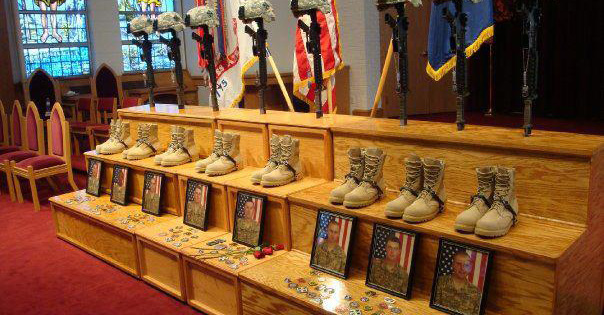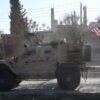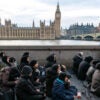
Eight Americans were killed at the Battle of COP Keating in Afghanistan. (Photo: “The Outpost” Facebook/Cynthia Woodard)
For some, Oct. 3 may be just another day. But for others aware of the sacrifice, today is remembered as the anniversary of two of the fiercest modern engagements of U.S. troops: the Battle of Mogadishu and the Battle of Combat Outpost Keating, which took place in 1993 and 2009, respectively.
Fought against different enemies, both battles became the deadliest at their time, resulting in significant American losses.
Those who risked their lives, including those who died, showed rare valor and courage, their comrades say.
“Every generation is the greatest generation,” James Carafano, vice president for foreign and defense policy studies at The Heritage Foundation, told The Daily Signal. “The heroism displayed in these battles reminds us of that.”
Carafano added:
Today’s military is an all-volunteer force. Our men and women in uniform purposefully put themselves in harm’s way, answering when our nation calls. We should be thankful for their selfless service.
The Battle of Mogadishu
It was the battle that inspired the book and movie “Black Hawk Down.”
The Battle of Mogadishu, fought Oct. 3, 1993, in the city of that name in Somalia was, at the time, the deadliest battle U.S. forces fought since Vietnam.
>>> Commentary: How to Wage a Better (Information) War Against Terrorism
President Bill Clinton originally sent troops into the African nation on a humanitarian mission. A joint special operations task force later was deployed in response to attacks by fighters under the command of Mohamed Farrah Aidid, a Somali warlord.
“Our men and women in uniform purposefully put themselves in harm’s way, answering when our nation calls. We should be thankful for their selfless service,” says @JJCarafano
Called Task Force Ranger, the special forces deployed to Mogadishu to capture Aidid and his top deputies. A rocket-propelled grenade hit a Black Hawk helicopter, killing both pilots on board.
Fire from the ground hit two more Black Hawks, downing one; a convoy quickly went to rescue the crew. Those on board the helicopter were killed except Chief Warrant Officer 3 Michael Durant, who was captured and eventually held for 11 days.
Troops fought through the streets, block by block, to get to the Black Hawks and their fallen comrades.
The Battle of Mogadishu lasted 15 hours, leaving 18 Americans dead and more than 80 wounded. Two of those killed, Army Master Sgt. Gary Gordon and Army Sgt. 1st Class Randall Shughart, posthumously were awarded the Medal of Honor for their bravery.
On the same date 16 years later, in the first year of President Obama’s first term, Army troops of Combat Outpost Keating waged a battle against a different enemy during what would become one of the deadliest days of the U.S. war in Afghanistan.
About 50 soldiers from 4th Infantry Division’s Bravo Troop, 3rd Squadron, 61st Cavalry Regiment called COP Keating home. The outpost sat in a valley in the Kamdesh district of Afghanistan, surrounded by three towering mountains.
That Oct. 3, more than 300 Taliban-led insurgents descended upon the base. In the ensuing battle, eight Americans were killed and 22 wounded. The military closed the outpost shortly afterward.
Today, let us remember those who lost their lives in the Battle of Mogadishu and the Battle of COP Keating.
>>> Happy Birthday, Long-Range U.S. Defense Missile
For their bravery during the gruesome battle, nine soldiers from COP Keating received the Silver Star, 18 were awarded the Bronze Star, 37 earned the Army Commendation Medal and 27 were awarded the Purple Heart, according to the Army.
The Medal of Honor was awarded to Staff Sgt. Clinton Romesha and Staff Sgt. Ty Carter for their heroism during the Battle of COP Keating — the second battle to warrant two such honors since the Battle of Mogadishu.
Storify below courtesy of CNN anchor Jake Tapper, who covered the Battle of COP Keating extensively and wrote about the base in his book, “The Outpost.”






























